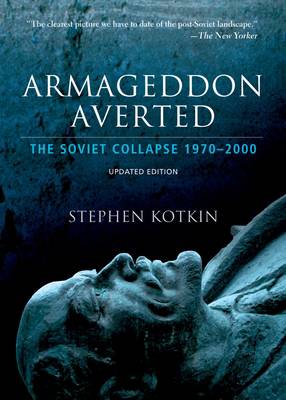
- Afhalen na 1 uur in een winkel met voorraad
- Gratis thuislevering in België vanaf € 30
- Ruim aanbod met 7 miljoen producten
- Afhalen na 1 uur in een winkel met voorraad
- Gratis thuislevering in België vanaf € 30
- Ruim aanbod met 7 miljoen producten
Zoeken
Armaged Aver Sovie Col Sin 1970 Upd Ed C
The Soviet Collapse, 1970-2000
Stephen Kotkin
Hardcover | Engels
€ 120,95
+ 241 punten
Omschrijving
Featuring extensive revisions to the text as well as a new introduction and epilogue--bringing the book completely up to date on the tumultuous politics of the previous decade and the long-term implications of the Soviet collapse--this compact, original, and engaging book offers the definitive account of one of the great historical events of the last fifty years. Combining historical and geopolitical analysis with an absorbing narrative, Kotkin draws upon extensive research, including memoirs by dozens of insiders and senior figures, to illuminate the factors that led to the demise of Communism and the USSR. The new edition puts the collapse in the context of the global economic and political changes from the 1970s to the present day. Kotkin creates a compelling profile of post Soviet Russia and he reminds us, with chilling immediacy, of what could not have been predicted--that the world's largest police state, with several million troops, a doomsday arsenal, and an appalling record of violence, would liquidate itself with barely a whimper. Throughout the book, Kotkin also paints vivid portraits of key personalities. Using recently released archive materials, for example, he offers a fascinating picture of Gorbachev, describing this virtuoso tactician and resolutely committed reformer as "flabbergasted by the fact that his socialist renewal
was leading to the system's liquidation"--and more or less going along with it. At once authoritative and provocative, Armageddon Averted illuminates the collapse of the Soviet Union, revealing how "principled restraint and scheming self-interest brought a deadly system to meek dissolution." Acclaim for the First Edition: "The clearest picture we have to date of the post-Soviet landscape."
--The New Yorker "A triumph of the art of contemporary history. In fewer than 200 pagesKotkin elucidates the implosion of the Soviet empire--the most important and startling series of international events of the past fifty years--and clearly spells out why, thanks almost entirely to the 'principal restraint' of the Soviet leadership, that collapse didn't result in a cataclysmic war, as all experts had long forecasted."
-The Atlantic Monthly "Concise and persuasive The mystery, for Kotkin, is not so much why the Soviet Union collapsed as why it did so with so little collateral damage."
--The New York Review of Books
was leading to the system's liquidation"--and more or less going along with it. At once authoritative and provocative, Armageddon Averted illuminates the collapse of the Soviet Union, revealing how "principled restraint and scheming self-interest brought a deadly system to meek dissolution." Acclaim for the First Edition: "The clearest picture we have to date of the post-Soviet landscape."
--The New Yorker "A triumph of the art of contemporary history. In fewer than 200 pagesKotkin elucidates the implosion of the Soviet empire--the most important and startling series of international events of the past fifty years--and clearly spells out why, thanks almost entirely to the 'principal restraint' of the Soviet leadership, that collapse didn't result in a cataclysmic war, as all experts had long forecasted."
-The Atlantic Monthly "Concise and persuasive The mystery, for Kotkin, is not so much why the Soviet Union collapsed as why it did so with so little collateral damage."
--The New York Review of Books
Specificaties
Betrokkenen
- Auteur(s):
- Uitgeverij:
Inhoud
- Aantal bladzijden:
- 304
- Taal:
- Engels
Eigenschappen
- Productcode (EAN):
- 9780195368642
- Verschijningsdatum:
- 23/12/2008
- Uitvoering:
- Hardcover
- Formaat:
- Ongenaaid / garenloos gebonden
- Afmetingen:
- 190 mm x 142 mm
- Gewicht:
- 436 g

Alleen bij Standaard Boekhandel
+ 241 punten op je klantenkaart van Standaard Boekhandel
Beoordelingen
We publiceren alleen reviews die voldoen aan de voorwaarden voor reviews. Bekijk onze voorwaarden voor reviews.











